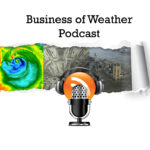
Topics covered include: Sucking CO2 out of the air, Cimate change and fresh water, Future of the the weather enteprise, I’m breathing plastic!, Business opportunities of climate change
Sucking carbon dioxide out of the air – 0:00:46
Louise Charles, Communications Manager, Climeworks
Many pundits believe that the opportunity to arrest climate change simply by reducing our carbon emissions has past.
They believe that the nature of the climate emergency is such that if we are to keep the rise in global temperatures below 1.5 or 2 degrees we’ll have to resort to more drastic action such as climate engineering.
For example, removing carbon dioxide from the atmosphere, seeding the atmosphere with chemicals to absorb sunlight, or putting huge mirrors into orbit to reflect the sun’s rays back into space.
Our first guest is Louise Charles who works for the Swiss company Climeworks. They’re pioneering technology which can literally suck carbon dioxide out of the atmosphere and then turn it into useful products.
For more information, visit: www.climeworks.com
Climate change and fresh water – 0:11:27
Dr Mark Fletcher, the Global Water Leader at Arup
There’s one resource in particular that’s critical to life as we know it and its availability is heavily influenced by climate change.
According to the United Nations, by 2025 two-thirds of the world’s population will face a shortage of it, although in one year the average American household uses nearly 500 tonnes of it.
In Nairobi, the urban poor pay 10 times more for it than New Yorkers, while some 30 tonnes of it are required to grow a day’s food for a family of four.
Some 80% of all illness in the developing world is related to it and there is about the same amount of it on Earth now as there was millions of years ago.
It is of course water. And to talk about we speak to leading expert, Dr Mark Fletcher, the Global Water Leader at Arup.
For more information, visit: www.arup.com
Future of the global weather enterprise – 0:22:58
Jim Anderson, Senior Vice President of Global Sales, Earth Networks and Chairman, Association of the Hydro-Meteorological Equipment Industry (HMEI)
The Association of the Hydro-Meteorological Equipment Industry, or HMEI for short, represents some 140 private sector providers of products and services in the meteorological, hydrological, environmental and related fields.
Based in Geneva, HMEI is fully accredited to the World Meteorological Organisation and other UN agencies and actively facilitates co-operation between its members and organisations across the public and private sectors.
HMEI members have a key role to play in helping to address the growing impacts of extreme weather & climate change and I spoke to the recently elected chairman, Jim Anderson, about his own company and the big challenges ahead for the hydrometeorological industry.
For more informstion, visit: www.hmei.org and www.earthnetworks.com
I’m breathing plastic! – 0:37:50
Steve Allen and Dr Deonie Allen, EcoLab in Toulouse
Many of us will be aware of Sir David Attenborough’s programme Blue Planet 2 and the problem it highlights of plastic polluting the world’s oceans.
Well, now it seems that plastic is also polluting the air we breathe. In fact, microplastics are being carried everywhere and anywhere by the weather, even to the world’s most remote mountain tops.
A study published in May by Nature Communications claims to show that microplastics are raining down just as hard in remote environments as they are in our cities.
The study’s authors, a team of scientists from the EcoLab Research Institute near Toulouse, collected samples from high altitudes in the Pyrenees that were far from sources of plastic waste. The nearest village was 6km away, the nearest town 25km, and the nearest city 120km.
They found an average of 365 plastic particles were being deposited per square metre every day.
To discuss this, we spoke to Steve Allen and Dr. Deonie Allen of the EcoLab Research Institute.
For more informtion, visit: www.strath.ac.uk/whystrathclyde/news/microplasticsblownbywindfoundinremotemountainousregion/
Business opportunities of climate change – 0:48:36
Bill Hosack, CEO and joint founder, Orbital Micro Systems
The weather impacts society at all levels and accurate weather forecasting is crucial to improving safety, security, and prosperity for businesses and society around the world.
Accurate weather forecasting also has a critical role to play when it comes to addressing the increasing impacts of extreme weather & climate change.
Examples include early warning systems which predict the impact and timing of severe weather events and help save lives; the development of more resilient power, transport and communications infrastructure; making buildings more energy efficient, not to mention increasing the efficiency of renewable energy; tracking the spread of infectious diseases such as malaria, dengue and zika; and, of course, helping to create significant improvements in agricultural production.
The critical ingredient of accurate weather forecasting is data – lots of it – and the provision of high quality data tailored to the needs of weather affected public and private enterprises offers a rapidly expanding number of new business opportunities.
One company determined to take advantage of these opportunities is Orbital Micro Systems or OMS. To capture this data the company is developing a fleet of micro satellites and the first of these was recently launched from the International Space Station.
To find out more and discuss the growing commercial opportunities of providing high quality weather data, we spoke to the OMS CEO, Bill Hosack.
For more information, visit www.orbitalmicro.com
To subscribe to the Business of Weather Podcast, click here
